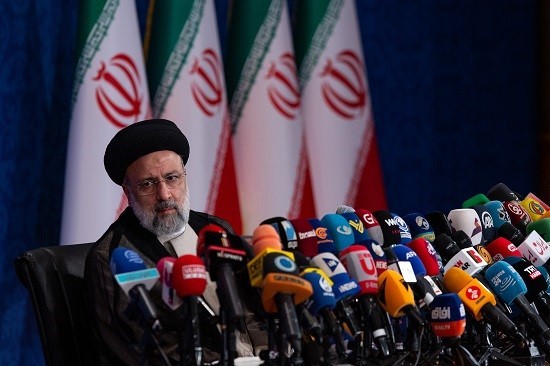There is a sense of renewed
optimism in Vienna after a bad week of negotiations that ended with the US and
the EU accusing Tehran of presenting new conditions while walking away from
compromises that were agreed to last June. As the seventh round of talks
resumes, it now appears that Russia and China had put pressure on Iran to
recommit to earlier pledges. On Friday the Iranian delegation expressed
readiness to resume talks on the basis of what was agreed to in previous
rounds.
اضافة اعلان
 Iran's President-elect Ebrahim Raisi speaks at his first news conference in Tehran, Iran, on June 21, 2021, following his election. (Photo: NYTimes)
Iran's President-elect Ebrahim Raisi speaks at his first news conference in Tehran, Iran, on June 21, 2021, following his election. (Photo: NYTimes)
After a pause of more than four
months, following the swearing in of a new Iranian president, the Iranians are
back in Vienna, but not after accelerating the activities of their nuclear
program with little oversight by the IAEA. The lack of inspections had angered
the Americans and Europeans, while pushing the Israelis to renew claims that
Tehran was only buying time and that its end game is to build a nuclear
arsenal.
Iran now says it is ready to make
a deal but insists on the lifting of sanctions and of getting an ironclad
commitment from the US that it will not withdraw from the agreement in the
future. In both cases Tehran is making a solid case. For the Biden
administration what Donald Trump had done, by withdrawing unilaterally from the
2015 Joint Comprehensive Plan of Action (JCPOA), he has sabotaged much of its
foreign policy agenda. Its main objective now is to salvage the agreement as it
recalibrates its geopolitical priorities, especially in the Middle East.
A deal could be reached very soon
as well. But the US finds itself in the difficult position of reining in its
key regional ally; Israel. Like his predecessor, Benyamin Netanyahu, the
current prime minister, Naftali Bennett, is ardently opposed to any
understanding with Tehran no matter the terms. Israeli officials have been
putting pressure on Washington to oppose a new deal and even asking the US to
prepare for a military strike against Iran’s nuclear facilities.
So far all they got from
Washington is lip service. It would be disastrous for the region if the US, or
worse if Israel, launched such a strike. One can be sure that it would result
in a disastrous domino effect and inflame an already troubled region.
While Israel is in denial, a
number of Arab countries are realizing that there is a limit to what the US can
do with regard to Iran. Such pragmatism can be seen in the recent UAE-Iran
talks and in rounds of negotiations taking place between Saudi Arabia and Iran
under Iraqi mediation. But that is not to say that Iran’s nuclear activities
are the only thing on the mind of regional leaders.
Yes we want to see Iran committed
to a peaceful nuclear program with international inspections. But the US should
not limit its consultations to Israel. Iran’s regional agenda has destabilized
the region and its neighbors do not like the way it is meddling in their own
domestic affairs.
In many ways an international deal
with Iran on the nuclear issue, along with opening direct talk with Tehran by
its neighbors, may have positive results regarding Iran’s regional behavior.
The two tracks should go together and Washington should support efforts by its
regional allies to establish lines of communication with Tehran.
By the same logic Iran’s leaders
must come to the realization that arriving at a deal in Vienna should launch a
new chapter in its relationship with its neighbors. They should end the
perception of their regime as an international and regional pariah. Such a new
beginning could bring peace to Iraq, Syria, and Yemen for starters where Iran
has clout.
A reduced US involvement in the
region may end up being a good thing.
Already yesterday’s foes are talking to
each other and realizing that there is a need to end a culture of political and
sectarian polarization as well as establishing a policy of good neighborhood.
By the end of the day the people of this region, including the Iranian people,
deserve a better life and opportunities for progress.
Of course the current sense of
optimism in Vienna may also dissipate over a detail here or a detail there.
Israel also may carry out a cyberattack against Iranian sites that could derail
the talks. The US has already warned Israel that aggravating Iran through such
attacks, as well as remote drone strikes, does not help its negotiators in
Vienna.
There is much at stake for Iran
and the rest of the world and so a deal could still be possible before the end
of the year. Iran has stacks of domestic challenges and its people are not
happy. A deal that ends the sanctions could be a much needed reprieve for the
regime and citizens.
Osama Al Sharif is a journalist
and political commentator based in Amman.
Read more Opinion and Analysis







